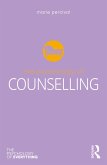What is counselling and how can it help? Does counselling work? How is counselling different from talking to my family and friends about my problems?
The Psychology of Counselling explains the different approaches to therapy and how they are used in practice, giving information on what counselling can help with and what it cannot do. It looks at cognitive and behavioural therapies, psychoanalysis, and humanistic psychology, as well as exploring positive psychotherapy and the move away from a disease-based approach to counselling. It also reflects upon the broader landscape of therapeutic spaces and gives consideration to professional issues in counselling, such as ethics, supervision, and duty of care to clients.
At a time when mental health and psychological well-being are central subjects of conversation in modern society, The Psychology of Counselling sheds light on the therapeutic process, what it involves, and how it works, to help all those seeking assistance for relieving emotional or psychological issues and improving their psychological wellness.
The Psychology of Counselling explains the different approaches to therapy and how they are used in practice, giving information on what counselling can help with and what it cannot do. It looks at cognitive and behavioural therapies, psychoanalysis, and humanistic psychology, as well as exploring positive psychotherapy and the move away from a disease-based approach to counselling. It also reflects upon the broader landscape of therapeutic spaces and gives consideration to professional issues in counselling, such as ethics, supervision, and duty of care to clients.
At a time when mental health and psychological well-being are central subjects of conversation in modern society, The Psychology of Counselling sheds light on the therapeutic process, what it involves, and how it works, to help all those seeking assistance for relieving emotional or psychological issues and improving their psychological wellness.








